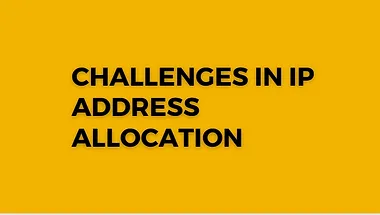IP addresses are fundamental to network connectivity and the Internet. They serve as unique identifiers for devices on a network, enabling routers and devices to locate and communicate with one another. Without IP addresses, online communication wouldn’t be possible.
To efficiently manage these addresses, the Internet employs a hierarchical model that helps networks in finding the right path for data transmission. If the allocation of IP addresses is mishandled, it could lead to memory exhaustion in Internet routers and parts of the Internet becoming unreachable.
In ths post, we’ll look into the challenges that come with IP address allocation.
Scarcity of IP Addresses
When an organization depletes its supply of free IP addresses, it must request more address space from an upstream provider or Regional Internet Registry (RIR). In the early days of the Internet, organizations received large IP address blocks, many of which went unused. We’re now reaching a point where new addresses for organizations are scarce.
Emerging markets allow organizations to buy and sell IP addresses. These markets help with the challenges in IP address allocation.
Difficulties in Regional Allocation
The Internet Corporation for Assigned Names and Numbers (ICANN) is currently responsible for the initial allocation of IP addresses. They allocate address blocks to RIRs, which, in turn, distribute them to requesting organizations. This forms a hierarchy of organizations, with each level receiving a subset of IP address space from the level above. However, ICANN has exhausted its /8 blocks for allocation. When RIRs run out of their allocations from ICANN, organizations will need secondary markets to obtain more IP address space.
The introduction of IPv6 as a replacement for IPv4 has been a slow process, with adoption gathering momentum gradually. As organizations start purchasing IP addresses from one another, we can anticipate increased granularity and decreased stability in the Internet routing infrastructure. The impact on regular Internet users will depend on how well equipment vendors and engineers address these emerging challenges.
Given the exhaustion of IPv4 addresses and the complexity of migrating to IPv6, operators must carefully consider how they will provide IP addresses for their customers. This isn’t just a technical decision; it directly affects operating expenses and the ability to scale the business effectively.
Why IPv4 Exhaustion Is a Concern
IPv4 exhaustion stems from the Internet’s remarkable popularity. When IPv4 was introduced in 1981, its 4 billion addresses seemed more than sufficient. Within a decade, it became evident that more addresses would be needed. IPv6, introduced in 1998 and ratified in 2017, can provide virtually limitless IP connectivity.
However, the transition from IPv4 to IPv6 is complicated due to the lack of backward compatibility. IPv6 adoption varies across devices, networks, and content, forcing communication service providers to support both IPv4 and IPv6. Operators face three basic choices: acquire more IPv4 addresses, expedite IPv4 to IPv6 conversion, or extend their IPv4 infrastructure while planning for IPv6 migration.
Deciding to Acquire Additional IPv4 Address Space
As communication service providers contemplate their IP connectivity options, they must consider their subscriber base’s long-term growth and the economic implications. Acquiring IPv4 address blocks, while possible through third-party brokers, can be challenging.
The price of IPv4 addresses has surged, making it challenging for providers. For the same cost, providers could build more infrastructure or accommodate more subscribers. The excessive allocation of IPv4 addresses in the past and inefficient usage practices have led to a shortage, even though the addresses are technically available.
Inefficient Allocation of IP Addresses
Initially, IP address distribution was haphazard, with organizations receiving more addresses than necessary. This trend continued as companies allocated address space without considering actual network needs.
As a result, many organizations are inefficiently using IP addresses, with large portions of allocated address space remaining unused. Furthermore, even the allocated address space often remains chaotic, complicating efforts to optimize network usage.
Closing Thoughts
IP address allocation faces challenges related to IP address exhaustion and historical allocation practices. Effective management and efficient usage of IP addresses are crucial to ensure the continued growth and stability of the Internet.
NRS supports the Internet community in finding sustainable and forward-thinking ways to address the challenges in IP address allocation. Join NRS today to take an active part in solutions that help us create an Internet for all.





Pingback: What is IP Address Distribution? - NRS